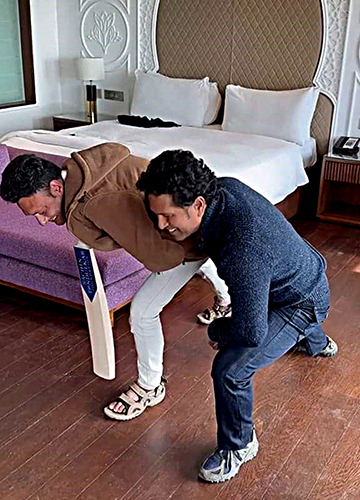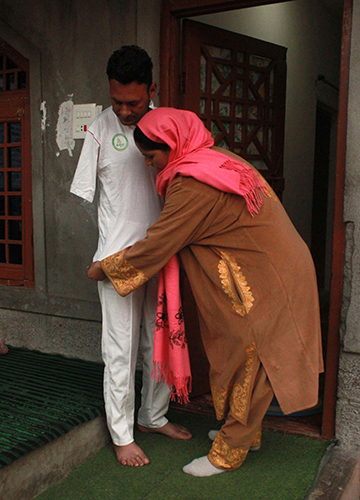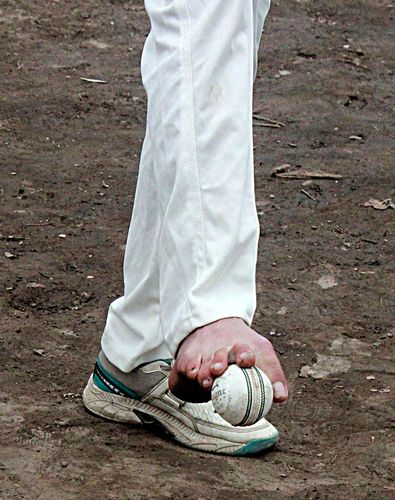Just before the Sangam bridge over the Jhelum in Anantnag, 40km from Srinagar, there is a path to the left. Drive on it for 10km and you reach Waghama, a village of cattle rearers and apple growers not found in travel guides or geography books. Yet, from the narrow lanes and old houses has emerged a story that has not only lit up social media, but grabbed the attention of Sachin Tendulkar.
Amir Hussain Lone, a cricketer with no arms, first found fleeting fame in 2016, when then India captain Virat Kohli tweeted about him, and Tendulkar sent him a bat as his token of appreciation. It took Amir another eight years to meet his idol in the flesh, but patience and grit have been his strongest allies in life.
Born to Bashir Ahmed Lone and Raja Begum, Amir is the second of four siblings. One day, when he was eight, his mother sent him off to the family workshop with lunch for his older brother. Amir, wearing a new jacket his father had brought him from a trip to Delhi, handed over the lunchbox and began playing near the bandsaw there. “My jacket got caught in the machinery, swiftly pulling me in and severing both my arms,” recalled the 34-year-old. They did not have a vehicle and sought help from the local Army camp. A car was called, but the driver, despite the family’s pleas, dropped them off at the highway and refused to go further. The Army personnel stepped in and drove them to hospital. The stay there was long, and cost a lot. Amir’s father sold the bandsaw and some land, all the while fielding questions from nosy villagers about the need to spend so much on a “disabled boy”.
However, Amir’s family stood behind him like a rock, none more so than his grandmother Fazi Begum, who died in 2010. Her belief in him gave Amir the strength to face the world.
For instance, when he started school after the accident, a teacher suggested he stay home. But Amir was adamant that he wanted to study. He relied on a classmate for notes, but one day when the latter refused, he started trying to write with his foot. “I practised on cardboard and then started writing on paper slowly,” he said.
After school, Amir would watch the village boys play cricket and longed to join them. But no one would pick him. When his friends would go swimming, he would watch from the bank. One day, unable to resist the urge, he jumped in and nearly drowned. A woman washing utensils nearby rescued him and told his grandmother, who forbade him from going near water again.
But Amir was curious. One day, he observed a duck swim with its webbed feet and decided to mimic the technique. After many tries, he astonished everyone by swimming across a stream during a fishing trip with friends. “Everybody was screaming that I would drown, but after reaching the other side, they were in awe,” he recalled with a smile. It was a pivotal moment in his life, igniting hope that he could play cricket and follow in the footsteps of his idol.
The next challenge was getting equipment. A shovel became the bat; a piece of wood, the ball; and his courtyard, the field. His grandmother became the bowler and Amir, with the shovel tucked under his chin like a violin, began playing some shots. Gradually, he perfected the technique.
Next, he learnt how to light a match with his foot and work a gas stove. With this, he could make food and tea for himself when alone. After finishing school, he enrolled in a college at Bijbehara in Anantnag. There, his friends encouraged him to apply for a government job, but his application was rejected. The interviewer was unimpressed with his skills, including his use of a laptop with his feet, and sent him home.
Though disheartened, Amir soon found another opportunity. While at college, he saw some students playing cricket on campus. He asked to join and was welcomed in. When it was his turn to bat, the players were amazed to see his technique. His teammates applauded his effort and told him to try out para-cricket.

He did, moving the selectors, and made his way into the team. But there was a problem. He was not allowed to wear track pants to college, only formal trousers. He was not given a meeting with the principal to state his case and he eventually dropped out. However, his passion for cricket remained; though he was more challenged than his teammates, his will and skill eventually made him captain of the Jammu and Kashmir team, in 2015.
His big opportunity came when his team played a tournament in Delhi. On the eve of the first match, he needed a shave but had not brought his kit. He knocked on a neighbour’s door in the hotel and asked for help. “The man said that if I could shave with my foot, he would gift me the shaving kit,” said Amir. “When I did, he hugged me and kept his promise.”
The following day, during the match against the Kerala team, he discovered that his benefactor was the umpire. Then, to everyone’s disbelief, Amir removed his right shoe, gripped the ball with his toes, and spun it―he was literally a leg-spinner. The umpire recorded this on his phone. Amir got a batter out caught at mid-on and also chipped in with 25 runs with the bat in a memorable win. The Kerala players carried him on their shoulders to the pavilion. “They were all in tears and I, too, was overcome with emotion,” said Amir.
Word about Amir spread, and his videos reached the national men’s team. In 2016, during the T20 World Cup in India, there was a life-changing call from former India player Ajay Jadeja. He initially thought it was a prank, but was overjoyed to hear that Jadeja had invited him to the semifinal between India and the West Indies.
Upon reaching Mumbai, he felt lost and could not find a phone to call Jadeja. “A man came to me and asked, ‘Do you really know Ajay Jadeja?’” he said. “I said ‘Yes.’ He gave me the phone and said, ‘Put it on speaker’.” When Jadeja did show up, everybody around was surprised. During his stay, Amir learnt that India bowler Ashish Nehra had sponsored his trip.
After India lost the semifinal, Kohli tweeted: “Amir embodies the determination to never accept defeat. Never lose hope, life never ends, it only begins. Hats off to this young man.” Former India cricketers V.V.S. Laxman and Aakash Chopra also tweeted about him. Tendulkar, who sent him a bat, posted: “Amir has made the impossible possible. Well done for inspiring millions who are passionate about playing the sport.”
Eight years later, when Tendulkar was in Kashmir this February, he invited Amir to his hotel. “Meeting him and receiving a signed bat with the inscription ‘real hero’ is the biggest achievement of my life,” said Amir. “I spent an hour with him and he said, ‘What you have achieved is unprecedented’.”
Amir has gone on to participate in tournaments in Afghanistan, Nepal and the UAE, but there are newer hurdles in life. He now has to balance his passion with his duties as a young father. He got married in 2018 and had a son, Imad, a year later. Also, being a para-cricketer is not a high-paying job. He recently worked as a night security guard at a local shop for a month, but was let go. The joint family, which includes Amir, his wife and child, his older brother’s family, and his younger sister, earn their livelihood from a small apple orchard they own. “He is not dependent on anybody,” said his wife, Shokee Akhtar. “He is a highly self-respecting man, and everybody appreciates that.”
Mother Raja Begum, full of pride, said her biggest concern after the childhood accident was how he would face life’s challenges. “He has not only overcome challenges, but has brought glory to our name,” she said. “Now, my biggest concern is his livelihood.”




